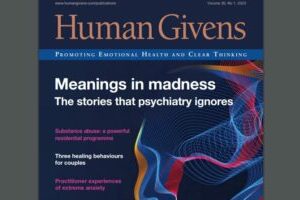From Human Givens: “John Read tells Denise Winn about his work showing adverse life events explain most types of emotional distress, and how the medical model ignores it.
READ: . . . One large study found that 90–95 per cent of people with a [schizophrenia] ‘diagnosis’ do not believe, at least at the beginning of their treatment, that there is anything biologically wrong with them. This, unfortunately is mispresented by psychiatrists as a lack of insight which, miraculously, becomes a symptom of the illness – i.e. trying to explain to the psychiatrist that there is nothing biologically wrong with you. This is a very effective power play and double bind – you can’t talk your way out of it. And if you get very upset, as a consequence, the more that confirms that you are crazy.
WINN: I thought that lack of insight referred to people thinking hallucinations or delusions they may have are actually real.
READ: That is one form of lack of insight, but, overall, it is a misuse of the term originally used by psychodynamic therapists. They used it to mean that someone wasn’t aware of something that had gone on in their life that was still affecting them, because they were repressing it. But psychiatry has co-opted it and one of the meanings now is that the person doesn’t have insight into the fact that they are ill – and that they need medication. One of the criteria for psychiatry’s version of lack of insight is not agreeing to have medication, which is quite astonishing. Then they turn it into an actual symptom of the illness, which is also strange. They call it anosognosia, which makes it sound like a real medical thing.
WINN: Apparently French neurologist Joseph Babinski created the term in 1914 to describe someone who had lost the ability to use or feel the left side of their body – but clearly it has been widened out to encompass ‘schizophrenia,’ too.
READ: Surveys show that most people with a ‘diagnosis of schizophrenia’ think that the voices they hear mean something about what is going on in their lives, but usually they aren’t asked about that.
WINN: . . . even when it is accepted that circumstances can play a part in mental distress, the medical profession often talks about a predisposition to vulnerability. In other words, they claim, it is genetic. You would say otherwise.
READ: Yes, because it is absolutely a mistake. In the 1970s, the stress vulnerability model was invented. It is in every textbook, taught to every mental health professional, that you inherit a predisposition to various things, and the strength of that predisposition determines how much stress is required to push you over the edge into whatever diagnosis you end up with. What biological psychiatry never tells people, and they have probably forgotten themselves, is that the original model was very clear that the predisposition could be trauma based.
The researchers included trauma itself as the predisposition to subsequent traumas and stresses, pushing someone over the cliff. And that is absolutely obvious. If, say, you have been physically abused as a child, you are going to be more sensitive to and more damaged by physical abuse later. So both aspects of the stress vulnerability model can be adversity based – or trauma based, to use the word they did. You don’t need a genetic predisposition.
Also, they haven’t found these genetic predispositions! They are still at it, after 50 or 60 years, saying, ‘Please give us another £50 million and we will find it one day.’ The genetic research has gone nowhere. Researchers have given up looking for specific depression or schizophrenia genes and now they are looking for combinations of hundreds of genes. It is a huge waste of money. I was at a conference with my colleague, Professor Richard Bentall, probably our best clinical psychology researcher, when he asked the geneticists, ‘Can you identify a single patient who has ever benefited in any way whatsoever from any of your research?’ And there was silence.”

***
Back to Around the Web











